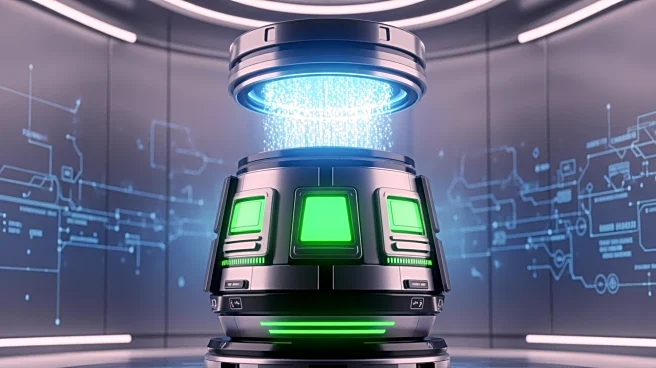What's Happening?
Amazon has announced plans to invest in modular nuclear reactors to meet the energy demands of its AI and cloud services. The company is collaborating with Energy Northwest and X-energy to develop the Cascade Advanced Energy Facility in Richland, Washington.
This facility will feature small modular reactors (SMRs) that offer a smaller footprint compared to traditional nuclear reactors, with the potential to generate up to 960 megawatts of power. Initially, Amazon plans to develop four SMRs, providing an initial power capacity of 320 megawatts, with the option to expand to 12 units. Construction is expected to begin before the end of the decade, with operations starting in the 2030s.
Why It's Important?
Amazon's investment in nuclear energy represents a significant shift towards cleaner energy solutions to support its growing technological infrastructure. As AI and cloud services continue to expand, the demand for sustainable energy sources becomes increasingly critical. By adopting nuclear power, Amazon aims to reduce its carbon footprint and ensure a reliable energy supply for its operations. This move could influence other tech companies to explore nuclear energy as a viable option, potentially leading to broader adoption of SMRs in the industry.
What's Next?
The development of the Cascade Advanced Energy Facility marks a pivotal step in Amazon's energy strategy. As construction progresses, the company will likely face regulatory and environmental challenges associated with nuclear energy projects. Stakeholders, including government agencies and environmental groups, will closely monitor the project's impact on local communities and ecosystems. Amazon's success in implementing SMRs could pave the way for future collaborations with other tech companies and energy providers, further advancing the use of nuclear power in the tech industry.
Beyond the Headlines
Amazon's venture into nuclear energy highlights the growing intersection between technology and sustainable energy solutions. The adoption of SMRs could lead to advancements in nuclear technology, making it more accessible and efficient for various industries. Additionally, this development raises questions about the ethical and environmental implications of nuclear energy, prompting discussions on safety, waste management, and long-term sustainability.















